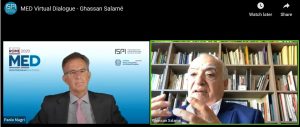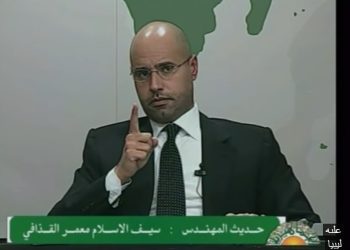By Sami Zaptia.
London, 24 June 2020:
Speaking during a webinar today organized by the Rome 2020 Med Dialogues / ISPI, former UNSMIL head Ghassan Salame blamed the international community for the failure to find a peaceful solution during his tenure in Libya.
Salame had been appointed in the summer of 2017 and resigned suddenly in March 2020. Answering questions about the real reasons for his sudden resignation, he confirmed during the webinar that he had developed a heart condition in February this year for which he had undergone a procedure in Paris.
A divided international community
The former UNSMIL head said that the big powers were divided. The US had ceased playing the role of the international Sherriff, the UN was divided, and the Europeans were not serious enough. He said that the US overconcentrated on fighting terrorism which took away from other issues and conflicts.
Terrorism could not be fought in isolation
On the relationship between civil wars and the fight against terrorism, Salame said the lesson learnt from this was that what is invested in fighting terrorism is then used in civil wars. He reiterated that terrorism could not be fought in isolation. It could not be extracted from the local political environment. Doing so achieves short term gains and that this ‘‘short cut’’ is very short-sighted. Other development issues such as state-building needed to be addressed as well.
Salame said the international community had no stick or exerted no pressure on the conflicting Libyan parties, who felt that there was no price to pay for their delay. He said his own country Lebanon paid a huge price for its civil war and failure to reach agreement quicker.
Salame said that the Libyans felt that there was no international community and so questioned who UNSMIL was representing. They knew the international community was divided and while they were happy to meet and listen to him politely, they felt under no pressure to act.
The Libyan parties knew the international community were not behind him/UNSMIL, which weakened him and the UN.
He said that he had tried his best to give the non-interfering states a leading role in Libya, but they missed the opportunity. He said he had failed to convince the European states of the Berlin Conference on Libya outcomes and that he was not sure they will get another opportunity like Berlin. ‘‘It could be too late’’ he added.
Europe obsessed with illegal migration – in isolation from solving Libya problem
Whilst he lamented that the US over-focused on the fight against terror, he also lamented Europe’s obsession with the issue of illegal migration – separate from a solution to the Libya problem. He insisted that the issue of illegal migration could not be solved in isolation from issues such as state-building and a more comprehensive solution to Libya.
Salame said Europe did not push for the Berlin outcomes. They agreed on them and the subsequent UN Security Council Resolution 2510 that enshrined them – but they did not take action to implement them. They did not ‘‘put a stick on the table’’ and there was ‘‘no price to be paid’’ for not implementing the Berlin outcomes. ‘‘They put nothing on the table. They did not even show the beginning of a stick’’, he lamented.
Giving Libya’s oil blockades as an example, Salame revealed that when the world economy was fully functioning, and oil demand was high, and prices were relatively higher – he would receive constant calls urging him to resolve Libya’s oil blockade problem.
In contrast, when world oil demand was down and there was a glut of oil with low prices – no one called him. In fact, he added that, in 2020 many countries wanted oil production in Libya to remain closed.
Failure of the Arab Spring
Salame was of the view that the Arab Spring had on the whole failed to create new democracies because the movement did not have their own leaders. He said the autocrats came in via the kitchen door and the Arab people were presented with ‘‘the barracks or the mosque’’, when the Arab Spring should have been about ‘‘a third way’’.
Looking ahead, Salame said he did not expect the era of disturbances in the MENA region to end quickly and that the Arab Spring started as a protest movement but was unable to translate itself into a political movement.
Taking a global perspective, Salame said the UN was in bad shape. It had lost its focus and its main role of producing peace and security.








